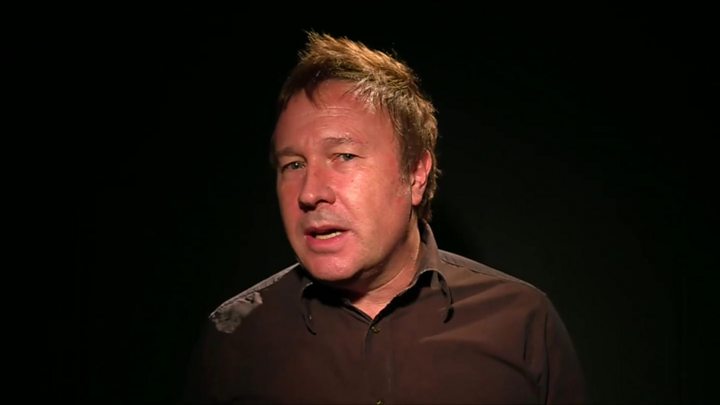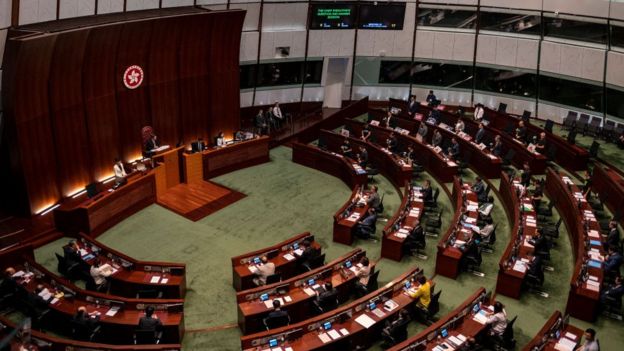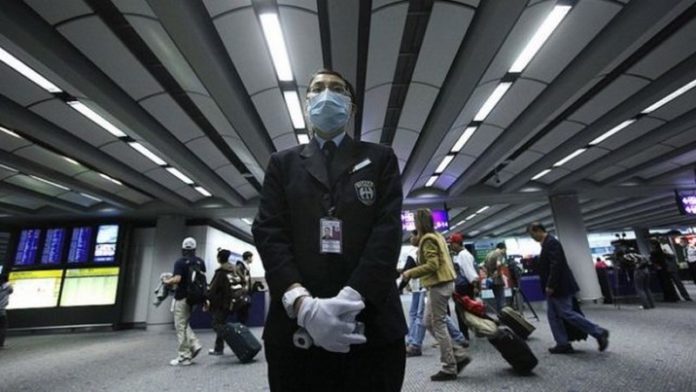The Hong Kong government has postponed September’s parliamentary elections by a year, saying it is necessary amid a rise in coronavirus infections.
Hong Kong is currently experiencing a spike in Covid-19 infections, and reported 121 new cases on Friday.
However, the opposition has accused the government of using the pandemic as a pretext to stop people from voting.
On Thursday, the government banned 12 pro-democracy candidates from running in the elections.
Opposition activists had hoped to obtain a majority in the Legislative Council (LegCo) in September’s poll, capitalising on anger at Beijing’s imposition of a controversial national security law in Hong Kong, and fears that the territory’s freedoms are being eroded.
Pro-democracy candidates had made unprecedented gains in last year’s district council elections, winning 17 out of 18 councils.
Chief Executive Carrie Lam said she would invoke emergency powers to postpone the elections, calling it the “most difficult decision I’ve made over the past seven months”.
“This postponement is entirely made based on public safety reasons, there were no political considerations,” she said.
How bad is the pandemic in Hong Kong?
Hong Kong has had more than 100 daily new cases, for 10 days in a row.
The overall numbers are still lower than those of many other places – but the spike comes after Hong Kong appeared to have contained the outbreak, with weeks of few or no local infections.
Now, it’s experiencing what’s been described as a “third wave” of infections, and on Wednesday, Ms Lam said the city was on the verge of a “large-scale outbreak”, which could cause hospitals to “collapse”.
Health experts have told the BBC that, with the reintroduction of social distancing measures, the rate of infection appears to have slowed, and they hope Hong Kong will be back to close to zero local infections within four to six weeks.
The city has introduced tough new measures to combat the virus, banning gatherings of more than two people.
What’s the argument for postponing elections?
The territory has had more than 3,200 confirmed infections, and 27 deaths, from the virus.
Ms Lam said Hong Kong’s pandemic was in “its worst situation since January” and “as community spread continues, the risk of a large-scale outbreak will increase”.
She said that with 4.4m registered voters in Hong Kong, the elections would involve “a large-scale gathering and an immense infection risk”, while social distancing measures would prevent candidates from canvassing.
She also said that proceeding with elections in September would pose a particular risk to elderly voters, and that Hong Kong had many registered voters in mainland China, and overseas, who would be unable to take part in the elections while border quarantine measures were in place.
What’s the argument against delaying the polls?
Opposition politicians say that, under local election laws, the polls can only be postponed by 14 days, and that a longer delay would “trigger a constitutional crisis in the city”.
Lawmaker Tanya Chan said she suspected pro-government politicians were more concerned about “their own election prospects” rather than “the severity of the pandemic”.
Some experts have suggested that measures could be put into place to make elections safer, such as reducing waiting times at polling stations – and that a delay of a whole year is not necessary.

What have other governments done?
At least 68 countries or territories postponed elections due to Covid-19, while 49 places held elections as planned, says the International Institute for Democracy and Electoral Assistance.
During her press conference, Ms Lam argued that many governments had also postponed elections by a year, including the London’s Mayoral elections, and local government elections in Australia’s New South Wales.
Her comparison was queried by journalists, who said the outbreak in Hong Kong was not as severe. London currently has a total of about 35,000 Covid-19 cases, compared to Hong Kong’s 3,200.
Meanwhile, in Australia, by-elections in Victoria went ahead as scheduled in March, as did a federal by-election in New South Wales.
Singapore held its general election earlier this month – and had its highest turnout in recent years, says Eugene Tan, a law professor and political commentator at Singapore Management University.
“There is never a good time for an election during a pandemic,” he says, but the vote went ahead with several safety measures in place and “demonstrates that it is possible to protect public health even as people go about exercising their democratic right to vote.”
How does the Legislative Council work?
The Legislative Council – or LegCo – helps to make and amend Hong Kong’s laws.
It is made up of 70 seats – but only 35 of these seats are directly voted for by the public.

Another 30 seats represent “functional constituencies” – these are voted for by smaller groups representing special interests, primarily businesses, banking and trade. Historically these sectors have been largely pro-Beijing.
The last five seats are made up of district councillors who are elected by the public to sit on LegCo.
This system, where only a proportion of LegCo councillors are chosen by the public, has been called undemocratic by critics but supporters of the system say it helps avoid populism and protects Hong Kong’s business interests.

